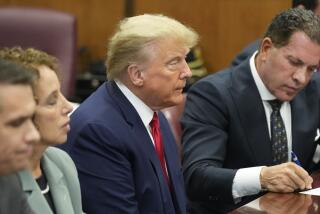The Senate owes the nation a full and fair impeachment trial
- Share via
As Congress reconvenes in the new year, it remains unclear when and under what circumstances the Senate will hold a trial on whether President Trump should be removed from office for “high crimes and misdemeanors.” That uncertainty needs to end.
House Speaker Nancy Pelosi should promptly transmit the two articles of impeachment approved by the House to the Senate so that arrangements for a trial can begin. For his part, Senate Majority Leader Mitch McConnell should agree that witnesses whose testimony could be vital can be called to testify either by the Senate on its own initiative or in response to requests by the House’s managers or Trump’s lawyers.
If McConnell is unwilling to commit to allow witnesses, Republican senators who want a fair trial should make it clear to the majority leader that they will join with Democrats to force his hand. Already one Republican senator, Lisa Murkowski of Alaska, has expressed concern over McConnell’s statement that the Senate would be working in “total cooperation” with the White House counsel’s office. On Monday Susan Collins (R-Maine) said she was “open to witnesses,” though she thought decisions on whom to call should wait until after arguments by lawyers and the responses to questions submitted by senators.
Good for them for once again demonstrating their willingness to think independently. If just a few more Republicans insisted on witness testimony, that would produce the necessary majority. A trial with witnesses would be both fair to Trump, whose lawyers should be able to cross-examine them, and in the national interest. As Sen. Doug Jones (D-Ala.) put it in an opinion column in the Washington Post: “For Americans to have confidence in the impeachment process, the Senate must conduct a full, fair and complete trial with all relevant evidence regarding the president’s conduct.”
Jones rightly argued that a fair trial would require testimony from past and present administration officials who didn’t testify in the House impeachment investigation, notably acting White House Chief of Staff Mick Mulvaney (who is also director of the Office of Management and Budget) and former national security advisor John Bolton. Mulvaney and Bolton are also among the witnesses Senate Minority Leader Charles E. Schumer has said should be subpoenaed to testify.
Bolton has been free with public comments about a variety of issues — most recently U.S. policy toward Iran. But he has failed to share with Congress what he knows about Trump’s apparent efforts to persuade Ukraine to investigate former Vice President Joe Biden, and any connection between that request and the decision to stall hundreds of millions of dollars in congressionally approved aid. Bolton’s lawyer tantalizingly said in November that Bolton was “personally involved” in many events, meetings and conversations relevant to the impeachment inquiry.
If anything, recent developments strengthen the case for a Senate trial that includes testimony from witnesses who could shed further light on Trump’s actions. On Dec. 29 the New York Times reported on how Trump’s opposition to releasing the $391 million in security assistance for Ukraine “sent shock waves through the White House and the Pentagon.”
The newspaper also reported on a meeting in August in which Bolton, Secretary of Defense Mark Esper and Secretary of State Michael R. Pompeo unsuccessfully sought to persuade Trump that releasing the aid was in the interest of the United States.
Did Trump explicitly acknowledge at that meeting or at any other that he was withholding aid in order to put pressure on Ukraine to announce the investigations? Testimony from Mulvaney, Bolton and other administration officials could answer that question.
The Senate also should hear from former New York City Mayor Rudolph W. Giuliani, Trump’s personal lawyer. (In his notorious July 25 telephone conversation with Ukrainian President Volodymyr Zelensky, Trump suggested that Zelensky talk to Giuliani, who “very much knows what’s happening.”)
House Democrats decided not to delay their impeachment vote because they were denied testimony from some witnesses. They were right not to let themselves be held hostage to the White House’s efforts to stall the proceedings and keep witnesses from testifying.
But now, with the process moving to the Senate, it’s appropriate to try to obtain such testimony. Republicans who insist that Trump did nothing wrong should support such an effort. If even only a few Republican senators insist on witnesses, that could make the difference. Of course, some witnesses might decline to testify nevertheless, citing the privileged nature of conversations with the president and the issue could be entangled in litigation.
Still, the goal should be a fair and complete trial. That is not what McConnell seems to have in mind, although he did say recently that Senate Republicans haven’t “ruled out witnesses.”
Yes, the Republican majority in the Senate gives that party a control over the process comparable to that exercised by the Democratic majority in the House. But that doesn’t give McConnell the license to rush through a half-baked trial when the allegations against the president are so serious. A handful of Republican senators could and should make the majority leader recognize that fact.
More to Read
A cure for the common opinion
Get thought-provoking perspectives with our weekly newsletter.
You may occasionally receive promotional content from the Los Angeles Times.









